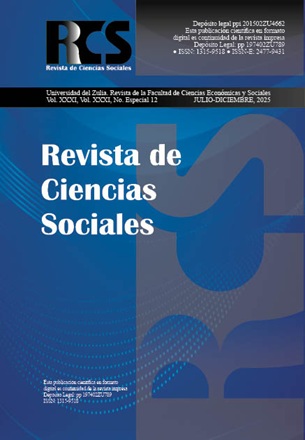Human interaction: Dissipative structure and will to power
Abstract
The main theme of this work is the relationship between entropy and the concept of the will to power, aiming to offer a perspective on the transformation of reality based on the relationship between science and philosophy. This project emerges from the concept of entropy (the second law of thermodynamics) as a quantity that determines the irreversibility of a process and the concept that explains the cause of natural transformation, tending toward a permanent increase in the universe, which underlies the degradation of systems and the convergence toward chaos. As a hermeneutic instrument for interpreting social interaction, this work uses thermodynamics as an argumentative tool framed within a philosophical and epistemological context, seeking to describe the logical
Downloads
References
Alves, P. R. L., Duarte, L. G. S., & Da Mota, L. A. C. P. (2018). Detecting chaos and predicting in Dow Jones Index. Chaos, Solitons and Fractals, 110, 232-238. https://doi.org/10.1016/j.chaos.2018.03.034
Araldi, C. L. (2007). Nietzsche: Caos y voluntad de poder. Estudios de Filosofía, (6), 5-18. https://doi.org/10.18800/estudiosdefilosofia.200701.001
Ben-Nahim, A. (2011). La entropía desvelada: El mito de la segunda ley de la termodinámica y el sentido común. Tusquets Editores S. A.
Ben-Nahim, A. (2020). Entropy and time. Entropy, 22(4), 430. https://doi.org/10.3390/e22040430
Briggs, J., & Peat, D. (2013). Espejo y reflejo: Del caos al orden. Guía ilustrada de la teoría del caos y de la ciencia de la totalidad. Gedisa Editorial.
Cherniavsky, A. (2006). La concepción del tiempo de Henri Bergson: El alcance de sus críticas a la tradición y los límites de su originalidad. Revisa de Filosofía y Teoría Política, (37), 45-68. https://www.rfytp.fahce.unlp.edu.ar/article/view/RFyTPn37a02
Colom, A. J. (2005). Teoría del caos y práctica educativa. Revista Galega do Ensino, 13(47), 999-1018. https://www.edu.xunta.gal/eduga/sites/site.eduga/files/revistagalega/rge47/eduga47/5.pdf
Davies, P., & Gribbin, J. (1996). Los Mitos de la Materia. McGraw-Hill Interamericana de España S. A.
Durán, R. (2019). Filosofía y ciencia: Críticas al uso que hace Bergson del argumento de Boltzmann contra la reversibilidad del universo. Filosofia Unisinos, 20(3), 228-237. https://doi.org/10.4013/fsu.2019.203.01
Elizondo, M. (2020). Comunidad Humana y Humanismo. Cuestiones de Filosofía, 6(27), 55-74. https://doi.org/10.19053/01235095.v6.n27.2020.12038
Gleick, J. (2012). Caos: La creación de una ciencia. Grupo Planeta.
Lombardi, O. (2001). La teoría del caos y sus problemas epistemológicos Revista de Filosofía, 57, 91-109. https://doi.org/10.5354/0718-4360.2001.44055
Maturana, H. R. (2009). La realidad: ¿Objetiva o construida? I. Fundamentos biológicos de la realidad. Anthropos Editorial.
Montoya, J. F., Giraldo, C., & Garcés, L. F. (2023). Entropía y tiempo: Gestores de la realidad. Revista Lasallista de Investigación, 20(2), 254-264. https://doi.org/10.22507/rli.v20n2a13
Natal, J., Ávila, I., Batista, V., Pinheiro, M., & Dias, C. (2021). Entropy: From thermodynamics to information processing. Entropy, 23(10), 1340. https://doi.org/10.3390/e23101340
Nietzsche, F. (1983). Así habló Zaratustra. Sarpe
Nietzsche, F. (2011). La gaya ciencia. Editorial Edaf, S.L.
Nietzsche, F. W. (2023). El Anticristo: Maldición sobre el cristianismo. Editorial Letra Minúscula.
Ósipov, A. I. (2003). Caos y autoorganización. Editorial URSS.
Peña, L. M. (2021). Filosofía de la matemática: La intuición en el pensamiento de Kurt Gödel. Filosofia Unisinos, 22(2), e22206. https://doi.org/10.4013/fsu.2021.222.06
Popovic, M. E. (2018). Researchers in entropy wonderland: A review of the entropy concept. Thermal Science, 22(2), 1163-1178. https://doi.org/10.2298/TSCI180115012P
Potter, J. (2006). La representación de la realidad: Discurso, retórica y construcción social. Paidós Ibérica Ediciones S. A.
Prigogine, I. (1991). El nacimiento del tiempo. Tusquets Editores S. A.
Prigogine, I. (2002). Las leyes del caos. Grupo Planeta.
Ribeiro, M., Henriques, T., Castro, L., Souto, A., Antunes, L., Costa-Santos, C., & Teixeira, A. (2021). The entropy universe. Entropy, 23(2), 222. https://doi.org/10.3390/e23020222
Rojas, C. (2011). Las ciencias y la hermenéutica. Revista Umbral, (5), 4-30. https://revistas.upr.edu/index.php/umbral/article/view/8436
Silvestrini, V. (1998). ¿Qué es la entropía? Grupo Editorial Norma.
Sometband, M. J. (1999). Entre el orden y el caos: La complejidad. Fondo de Cultura Económica.
Tapia, H. (2022). Aprendizaje cognoscitivo impulsor de la autorregulación en la construcción del conocimiento. Revista de Ciencias Sociales (Ve), XXVIII(E-5), 172-183. https://doi.org/10.31876/rcs.v28i.38154
Valentim, M. A. (2022). Filosofía y entropía. Anacronismo e Irrupción, 11(21), 539-558. https://publicaciones.sociales.uba.ar/index.php/anacronismo/article/view/7091

This work is licensed under a Creative Commons Attribution-NonCommercial-ShareAlike 4.0 International License.




1.jpg)

1.jpg)


























